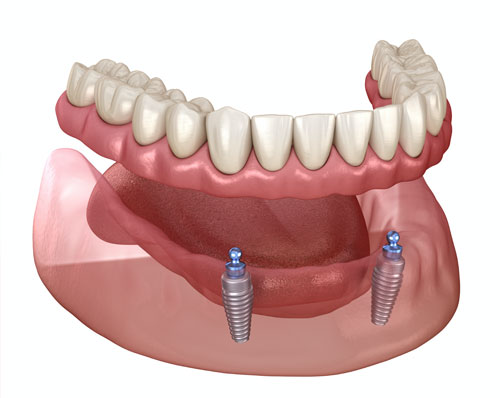Once you lose your natural teeth and replace them with dentures, you might think that is that. After all, false teeth will always be false teeth in Ajax, no matter how they are replaced. However, this isn’t strictly true, and options for replacing missing teeth are available. While you can have traditional dentures, it’s also possible to have implant-supported dentures. There are some significant differences between the two solutions to consider.
What Are the Differences?
Traditional dentures are made to fit the shape of your gums and the underlying bone supporting them. The denture sits directly on the gums and often rubs uncomfortably, creating sore spots. Conventional dentures are removable and easy to clean, and some people still think they are the best choice.
Implant-supported dentures do not rest on the gums. Instead, the denture is supported by four or more dental implants that help retain it firmly in place. The dental implants consist of tiny screws that are inserted directly into the jawbone, providing excellent support. Perhaps the most significant difference is that implant-supported dentures are not removable. Instead, they are family screwed or cemented onto the implants and remain in your mouth all the time. Only your dental implant dentist in Whitby can remove an implant-supported denture, which may be necessary for cleaning and general maintenance.
Traditional Dentures Versus Implant-Supported Dentures
One of the most significant differences is how conventional dentures rest on the gums, whereas the jawbone supports implant-supported dentures. Because traditional dentures rest on the gums directly, they have nothing to hold them in place, relying entirely on the jawbone for support. Unfortunately, when you lose natural teeth, the bone that used to surround your tooth roots quickly begins to resorb because it loses the stimulation provided by these roots. The loss of bone can significantly affect the stability of traditional dentures as very soon they become ill-fitting and loose. It is possible to reline or adjust the denture to fit the shape of the mouth more accurately. Still, over time, the ridge of bone that used to support natural teeth gradually becomes flatter and narrower.
Dental implants are inserted directly into the jawbone, stimulating the bone in much the same way as a natural tooth root. Consequently, bone loss is prevented around the dental implant. There is no movement because dental implants hold the implant-supported dentures firmly in place. The implant-supported dentures don’t sit directly on the gums and will not rub uncomfortably. You will immediately recognize the benefits outlined here if you already wear conventional dentures. When teeth don’t move around, it’s easier to talk clearly and to chew your food correctly. This eliminates the embarrassment of loose teeth and makes it easier to choose nutritious foods.
Which is the Best Option in the Longer Term?
Initially, some people will opt for traditional dentures because they are cost-effective. However, they can need continual adjustments, and the changing shape of the jawbone can affect facial appearance. Many people with conventional dentures are embarrassed to eat in public and may avoid social situations.
In comparison, implant-supported dentures can initially cost a bit more, but they are frequently the best choice in the long term. Because dental implants preserve the existing bone, an implant-supported denture has greater biting strength and, of course, cannot move embarrassingly. Implant-supported dentures are easy to care for and often restore lost confidence and self-esteem that occurs with tooth loss in Bowmanville.
Implant-supported dentures in Oshawa are just one option that could help you if you face imminent tooth loss. Here at Durham Dental Solutions, we offer the most advanced and up-to-date dental implant treatments, and each procedure is customized to meet your unique oral health needs.


